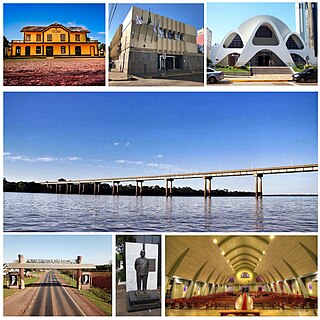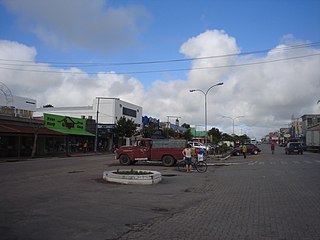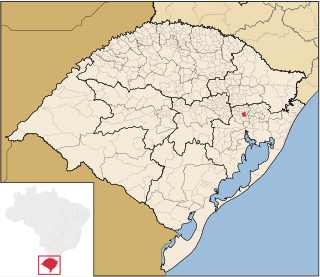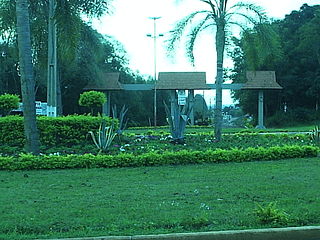
Rio Grande do Sul is a state in the southern region of Brazil. It is the fifth-most populous state and the ninth-largest by area. Located in the southernmost part of the country, Rio Grande do Sul is bordered clockwise by Santa Catarina to the north and northeast, the Atlantic Ocean to the east, the Uruguayan departments of Rocha, Treinta y Tres, Cerro Largo, Rivera, and Artigas to the south and southwest, and the Argentine provinces of Corrientes and Misiones to the west and northwest. The capital and largest city is Porto Alegre. The state has the highest life expectancy in Brazil, and the crime rate is relatively low compared to the Brazilian national average. The state has 5.4% of the Brazilian population and it is responsible for 6.6% of the Brazilian GDP.

São Borja is a city in the Brazilian state of Rio Grande do Sul. São Borja is the oldest municipality in the Brazilian state of Rio Grande do Sul and was founded in 1682 by the Jesuits as the first of the Seven Points of the Missions, and named São Francisco de Borja, in honor of Saint Francis Borgia.
Talian, or Brazilian Venetian, or Vêneto is a Venetian dialect spoken primarily in the Serra Gaúcha region in the northeast of the state of Rio Grande do Sul in Brazil. It is also spoken in other parts of Rio Grande do Sul, as well as in parts of Espírito Santo and of Santa Catarina.
Rio Grande is a river flowing to the Gulf of Mexico, forming a part of the Mexican-United States border.

Unisinos is a Brazilian private Jesuit university founded in 1969. Its main campus is located in Southern Brazil, in the city of São Leopoldo, state of Rio Grande do Sul. Unisinos has more than 30,000 students in its 91 undergraduate programs, 19 academic master's programs, 6 professional master's programs, and 14 PhD programs, with six schools – Polytechnic, Business, Law, Health, Creative Industry, and Humanities.

Chuí is a municipality located in the state of Rio Grande do Sul, Brazil. It's the southernmost town of Brazil, located at latitude 33°41′0″S. A border town, it shares its name with sister city Chuy, Uruguay. The two towns constitute one contiguous urban area, divided by a border street called Avenida Internacional, called Avenida Uruguai in Brazil, a situation also seen in a few other Brazilian border points, such as between Santana do Livramento (Brazil) and Rivera (Uruguay).

São Sebastião do Caí is a city near Porto Alegre in the Brazilian state of Rio Grande do Sul. It has a population of about 25,000 inhabitants. The principal university is the University of Caxias do Sul, often abbreviated as UCS. Through the middle of the city runs the river Caí, whose source is in the mountains of São Francisco de Paula, and which empties into Guaíba Lake. The city was founded on May 1, 1875. Like many towns in the state which were settled by German-speaking Europeans in the 19th century, the German language is still present in daily family and community life, if not as much in the public sphere since World War II.

Rio Grande is a municipality (município) and one of the oldest cities in the Brazilian state of Rio Grande do Sul. It was the state capital from 1835 to 1845. It is the most important port city in the state and has one of the most important maritime ports in Brazil.

Caçapava do Sul is a Brazilian municipality in the state of Rio Grande do Sul, located on the banks of the Camaquã River. As of 2020, the city has an estimated population of 33,548. It was the 2nd capital of the Piratini Republic from 1839 to 1840.

Cambará do Sul is a municipality in the state of Rio Grande do Sul, Brazil. Its population was approximately 6,406 in 2020. It has an area of approximately 1212 km2.

Caraá is a municipality in the state of Rio Grande do Sul, Brazil where Rio dos Sinos' river rises. It was originally part of the city Santo Antônio da Patrulha, emancipated on December 28, 1995.

Eldorado do Sul is a municipality in the state of Rio Grande do Sul, Brazil. It is located in the metropolitan area of Porto Alegre, the state's capital and largest city, opposite the capital on the right bank of Guaíba River. Population: 41,902.

Guarani das Missões is a municipality in the state of Rio Grande do Sul, Brazil.

Ivorá is a Brazilian municipality in the state of Rio Grande do Sul. According to the 2022 census by the Brazilian Institute of Geography and Statistics (IBGE), the municipality has a population of 1.929 inhabitants.
Mariano Moro is a municipality in the state of Rio Grande do Sul, Brazil.

Muçum is a small town in the state of Rio Grande do Sul, Brazil.

Nova Palma is a municipality in the state of Rio Grande do Sul, Brazil.

Planalto is a municipality in the state of Rio Grande do Sul, Brazil, located at 27°19′44″S53°03′31″W, at an elevation of 568 meters above sea level. It has a total area of 237.35 km2. Its estimated population in 2020 was 10,019 inhabitants.

São Jerônimo is a municipality in the state of Rio Grande do Sul, Brazil.
















